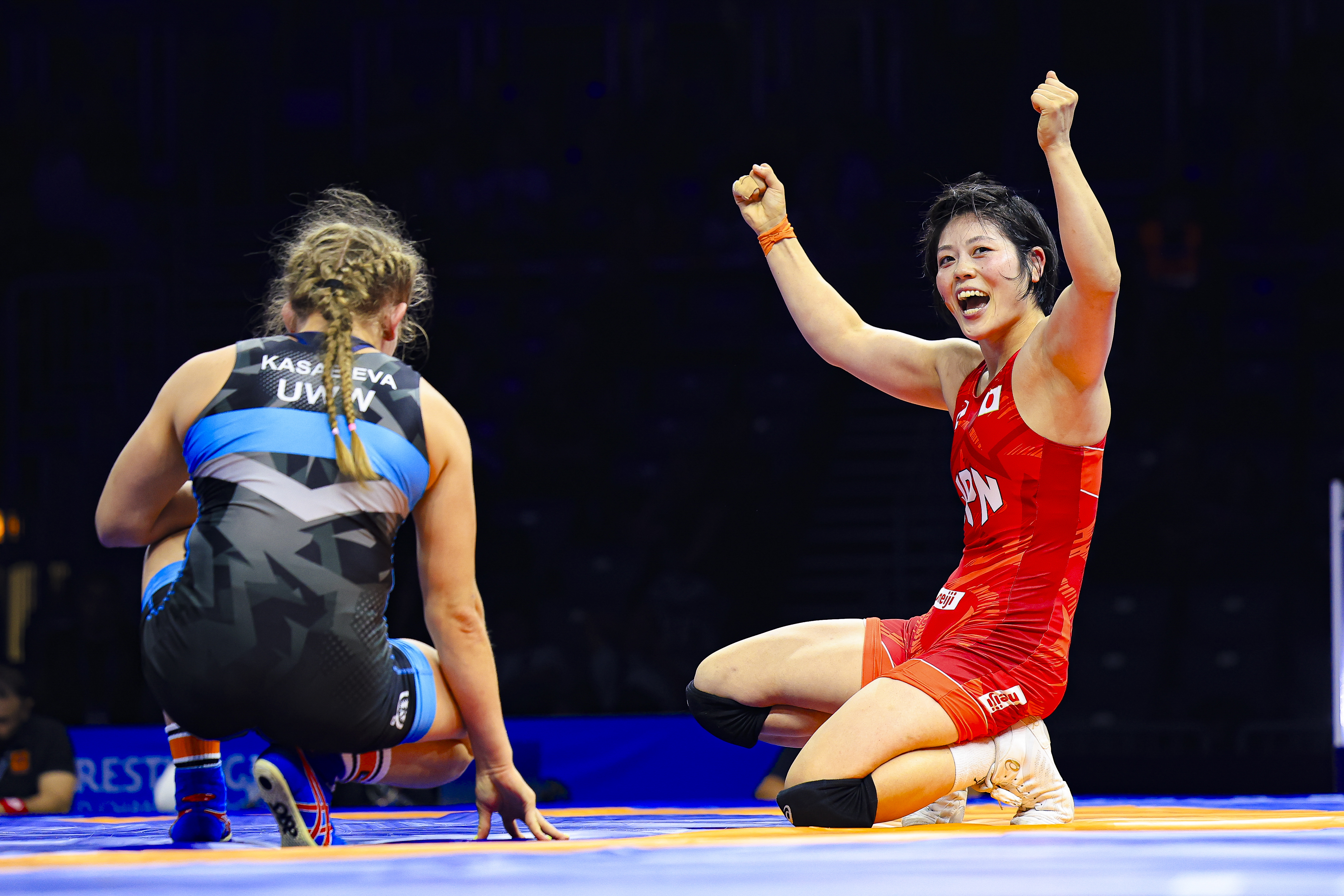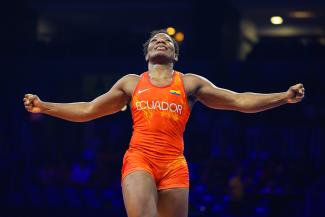In the 57kg final, Maroulis had her work cut out for her with the quick and powerful Son, this year's Asian silver medalist.
"She's an amazing opponent," Maroulis said. "I knew she was going to be tough. I watched all of her film. I'm like, my gosh, she's so good."
Maroulis had to fight out of a double-leg attempt in the first period, in which she received an activity point for the only score. In the second, Son received an activity point, then went ahead 2-1 by scoring a stepout at 1:32.
It looked like it might end that way until Maroulis, using a trip to great effect as she had done all tournament, sent Son reeling backward, then spun behind as Son tried to whip her over with :05 on the clock.
"I had to really, really dig deep for that and, I don't know, before the last exchange started, I just had to dig deep and find it," Maroulis said. "It was just some scramble flurry and just that it came out my way. I'm grateful."
The U.S. wrestler added the title to the ones she won in 2015, 2017 and 2021. She also has an Olympic gold from 2016, when she dealt the legendary Saori YOSHIDA (JPN) her lone international loss, and three Olympic medals overall.
Maroulis said that she had to deal with a blood vessel problem that curtailed her training starting in the spring, and did not return to full-fledged practice until about two weeks ago.
With her conditioning limited, she said she aimed to end her matches early, which resulted in her ending all three of her matches leading up to the final by fall.
"I was like, I'm just going to start working on training because I'm not conditioned enough to go six minutes," Maroulis said. "I'm literally not conditioned enough. But if I pin, no one has to know that."
Maroulis said she is currently undecided about continuing her career. But should she go on, it could put her on a collision course with one of the sport's rising stars, Akari FUJINAMI (JPN), the Paris Olympic champion at 53kg who announced that she was moving up to 57kg in the runup to the 2028 Los Angeles Olympics.
"I would love to wrestle her," she said. "I've been wrestling for so many years, I want to wrestle the best of the best, and she's phenomenal. I've heard and seen great things about her.
Maroulis said the two have never had a chance to work out together. "We message back and forth, actually we were trying to go to a camp together, it just didn't work out in time for the Olympics. I found she was going to 57[kg], I said, 'Oh my gosh.' It's a great opportunity for both of us."
At 50kg, Won dominated her gold-medal showdown with Asian silver medalist Yu ZHANG (CHN) from the start, storming to an eight-point lead in the first period and holding on for an 8-2 victory.
"This medal and the championship belt I’ve won are just the first step in repaying my parents for all their sacrifices," Won said. "From now on, I’ll work even harder to become an Olympic champion."
Her victory came a day after Kyong Ryong OH (PRK) won the 55kg gold to become the second women's world champion in their country's history. They joined Yong-Mi PAK (PRK), who won the 53kg gold in Nur-Sultan in 2019.
Won became so overcome with emotion, she tearfully hugged the referee after the match, then went over and did the same with the side judges. Then she hugged her coaches, and during the medal ceremony, shed tears as the national anthem was played.
"The moment I took first place, all the tough days of training flashed before my eyes and I couldn’t hold back my tears," she said. "And when I thought about sharing the news with my mom and dad, the tears came again."
 Miwa MORIKAWA (JPN) celebrates after winning the 65kg final at the World Championships. (Photo: United World Wrestling / Kadir Caliskan)
Miwa MORIKAWA (JPN) celebrates after winning the 65kg final at the World Championships. (Photo: United World Wrestling / Kadir Caliskan)
At 65kg, Morikawa cruised to an 8-0 victory over Alina KASABIEVA (UWW) to regain the title she won in 2022, capping a year in which she also won the Ranking Series Tirana event and a second career gold at the Asian Championships.
Morikawa scored all of her points by shooting for a single, then fighting off a whizzer by Kasabieva to gain control for a pair of takedowns in each period.
"It's my first time to face her, but comparatively she was easier to wrestle than my semifinal opponent," Morikawa said, referring to her semifinal victory over former world champion Irina RINGACI (MDA), albeit a 10-0 decision.
"I couldn't get in on my tackles, and that part is something that I have to change. I'll be going to a heavier weight class and I want to be able to knock off the top wrestlers."
For Morikawa, competing at 65kg now is part of a process aimed at being competitive in the race to make the 2028 Los Angeles Olympics, almost surely at 68kg, after missing out on Paris.
"It was great that I won the championship, but the next step will be starting soon. I can be happy today, but from tomorrow I'll have to start working hard in practice."
In between her two world titles, Morikawa took a world bronze at 72kg in 2023, then returned to 65kg in 2024, only to have to settle for a bronze again.
"It was a long time [between titles], and there was the time that I missed out on the Olympics, but I will use this victory as inspiration for what is coming next. It will be the start of a much more difficult fight than up to now, so I have to renew my determination."
While two world golds is no small accomplishment, Morikawa joked that it still leaves her well behind her coach, who was in her corner on Wednesday and accompanied her on the victory lap on the mat.
"I still only have two titles, so I'm about 10 behind the coach who was in my corner," Morikawa said of Kaori ICHO (JPN), the four-time Olympic and 10-time world champion.
Smirnova stuns Yoshimoto for 50kg bronze
Elizaveta SMIRNOVA (UWW) pulled off the surprise of the bronze-medal matches, stunning former world champion Remina YOSHIMOTO (JPN) at 50kg with a stepout in the final seconds for a 3-3 win on criteria.
Yoshimoto, a two-time Asian champion, received an activity point, then gave up a takedown when Smirnova countered and got behind to a 2-1 lead. In the second period, Yoshimoto finally got through, scoring a takedown with :54 left. But she failed to hold off Smirnova's final push, leaving her devastated and in tears.
Prior to coming to Zagreb, Yoshimoto's only losses in any competition since 2019 were to compatriot and Tokyo Olympic champion Yui SUSAKI (JPN), whom she lost to four times. That limited her to a single previous appearance at the World Championships in 2021, when she won the gold.
The other 50kg bronze went to Evin DEMIRHAN (TUR), who also needed a late score in posting a 3-2 victory over Munkhnar BYAMBASUREN (MGL) and adding to the world bronze she won back in 2017.
Byambasuren scored a takedown while on the activity clock to take a 2-0 lead into the second period, and it looked like that might hold up when Demirhan gained a 2-point exposure off an inner thigh block with :15 left. Byambasuren came close to getting behind in the final seconds, but fell short and an unsuccessful challenge handed Demirhan her final point.
The victory took some of the sting out a serious knee injury that Demirhan suffered in the final exchange. She limped off the mat and was taken from the main floor in a wheelchair, then was carried by two fellow medalists to the podium during the medal ceremony wearing a walking cast.
Japan was dealt another set back a short time later in the 57kg bronze-medal bouts, when three-time European champion Olga KHOROSHAVTSEVA (UWW) scored a takedown and exposure in the second period to upend Himeka TOKUHARA (JPN) 4-1.
As with Demirhan, Khoroshavtseva's victory ended a long medal drought -- her previous bronze had come in 2019.
Paris Olympic bronze medalist Kexin HONG (CHN) picked up her first world medal, surging to a 10-0 victory over Iryna KURACHKINA (UWW) in the other 57kg match.
Moldova's national hero Ringaci earned a fourth career world medal by beating Iryna KOLIADENKO (UKR) 6-3 for a 65kg bronze, scoring a takedown in the first period and two in the second.
Two-time Asian silver medalist Enkhjin TUVSHINJARGAL (MGL) had the lead on criteria when she scored an exposure at the edge while holding off an attack by Macey KILTY (USA) to clinch a 4-2 win for the other 65kg bronze.
At 76kg, another Olympic bronze medalist added a world bronze when Marin stormed to a 10-0 victory over PRIYA (IND), setting the mood when she scored the first of her five takedowns by lifting the Indian in the air and dumping her to the mat.
Kylie WELKER (USA) added to the bronze she won last year at 72kg by holding on for a 6-2 victory over Anastasiya ALPYEYEVA (UKR) for the other 76kg bronze. Welker scored a takedown and gut wrench in the first period, then after Alpyeyeva came back with two stepouts,
clinched the win with a takedown with :14 left.
Day 5 Results
Women's Wrestling
50kg (21 entries)
GOLD: Myonggyong WON (PRK) df. Yu ZHANG (CHN), 8-2
BRONZE: Elizaveta SMIRNOVA (UWW) df. Remina YOSHIMOTO (JPN), 3-3
BRONZE: Evin DEMIRHAN (TUR) df. Munkhnar BYAMBASUREN (MGL), 3-2
53kg (23 entries)
SEMIFINAL: Lucia YEPEZ (ECU) df. ANTIM (IND), 5-3
SEMIFINAL: Haruna MURAYAMA (JPN) df. Hyongyong CHOE (PRK), 2-1
57kg (22 entries)
GOLD: Helen MAROULIS (USA) df. Il Sim SON (PRK), 3-2
BRONZE: Olga KHOROSHAVTSEVA (UWW) df. Himeka TOKUHARA (JPN), 4-1
BRONZE: Kexin HONG (CHN) df. Iryna KURACHKINA (UWW) by TF, 10-0, 2:22
62kg (22 entries)
SEMIFINAL: Sakura MOTOKI (JPN) df. Orkhon PUREVDORJ (MGL) by TF, 14-1, 4:15
SEMIFINAL: Ok Ju KIM (PRK) df. Amina TANDELOVA (UWW) by TF, 14-3, 6:00
65kg (17 entries)
GOLD: Miwa MORIKAWA (JPN) df. Alina KASABIEVA (UWW), 8-0
BRONZE: Irina RINGACI (MDA) df. Iryna KOLIADENKO (UKR), 6-3
BRONZE: Enkhjin TUVSHINJARGAL (MGL) df. Macey KILTY (USA), 4-2
68kg (24 entries)
SEMIFINAL: Ami ISHII (JPN) df. Buse TOSUN (TUR) by TF, 11-0, 2:34
SEMIFINAL: Yuliana YANEVA (BUL) df. Jia LONG (CHN), 6-1
72kg (17 entries)
SEMIFINAL: Alla BELINSKA (UKR) df. Nurzat NURTAEVA (KGZ) by Fall, 5:00 (11-6)
SEMIFINAL: Nesrin BAS (TUR) df. Zelu LI (CHN), 9-6
76kg (19 entries)
GOLD: Genesis REASCO (ECU) df. Aiperi MEDET KYZY (KGZ), 4-2
BRONZE: Kylie WELKER (USA) df. Anastasiya ALPYEYEVA (UKR), 6-2
BRONZE: Milaimy MARIN (CUB) df. PRIYA (IND) by TF, 10-0, 4:07

 A tree plantation drive was also conducted in Sarigerme. (Photo: United World Wrestling)
A tree plantation drive was also conducted in Sarigerme. (Photo: United World Wrestling)

 Miwa MORIKAWA (JPN) celebrates after winning the 65kg final at the World Championships. (Photo: United World Wrestling / Kadir Caliskan)
Miwa MORIKAWA (JPN) celebrates after winning the 65kg final at the World Championships. (Photo: United World Wrestling / Kadir Caliskan)
Share your thoughts.
Comments